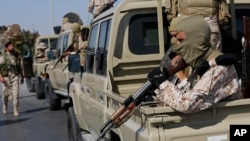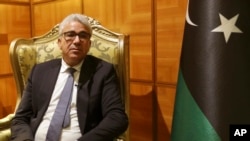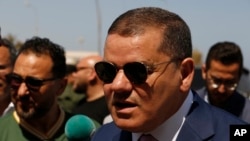Militia supporters of Libya's two rival prime ministers fired rockets and automatic weapons at each other early Tuesday, forcing parliament-appointed Prime Minister Fathi Bashaga to withdraw from the capital after a failed attempt to take control of government administration buildings.
Rival U.N.-appointed Prime Minister Abdul Hamid Dbeibah's supporters appear to have forced Bashaga to retreat, leaving government ministries under Dbeibah's outgoing administration. Dbeibah warned that he would "strike with an iron fist anyone adversely affecting the security of the people."
After withdrawing from Tripoli, Bashaga said he hoped to return in the coming hours and would present his case to the people.
"He says that he received a very good reception during his three hours in the capital and was able to give his message to those in various positions, and will address the Libyan people on Wednesday."
Bashaga's interior minister, Issam Abou Zareiba, urged all parties to respect peace in the capital.
He says that his ministry wants all Libyans to know that it is working to protect the lives and belongings of the people, and that it is acting peacefully and within the limits of the law. He urged security forces to cooperate with his government in order to take control of ministries in the capital.
U.N. special envoy to Libya Stephanie Williams told rival forces in a tweet to "maintain peace on the ground and refrain from damaging people's property."
Libyan analyst Ibrahim Belkacem told Saudi-owned al Arabiya TV that he thinks Bashaga "has weakened his political position by trying to take control of the capital, but that Dbeibah does not have a very strong political hand, either."
The Libyan parliament, which appointed Bashaga, suggested last week that he set up his government in the central Libyan port city of Sirte, hometown of former leader Moammar Gadhafi, who was ousted and killed in a 2011 revolution.
Aya Burweila, a Libyan security analyst, tells VOA that she thinks "Dbeibah's clinging to power ... represents a setback to democracy and accountability in Libya, as well as the unity of the Libyan state."
Burweila also defends the proposal for Bashaga to set up his government in Sirte so Libya can "cease being hostage to the militias in Tripoli."
Dbeibah, who was named prime minister by the U.N. in 2020, was due to step down after elections that were to take place in December 2021. He refused, however, to resign after the elections were postponed.
Libyan parliamentary leaders and the country's ruling council of state held talks in Cairo over the weekend to discuss various political issues, including rescheduling elections and what to do about resuming oil production and sharing of oil revenues.






